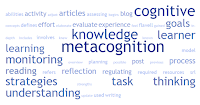Cognition and Metacognition
Description of Solo Task
Topics in Article
Goals
Long Term: To be an expert in Self-Regulated LearningShort Term: To understand cognition and metacognition aspects of self-regulated learning
Confidence in Achieving goals
Positive.ICE Notes
Metacognition
In many SRL literature, Metacognition is defined as "thinking about one's thinking". The Cambridge Dictionary defines thinking as the activity of using your mind (the part of a human that makes it possible for one to think, feel, and understand things). Learning and the process of acquiring knowledge involve metacognition. Metacognition is evident in the learning process as knowledge, experience, goals, and strategies. Learning as a task includes reading, understanding, making notes, memorizing, etc. At the onset of a task, the learner thinks to develop an understanding of the tasks (complexity, difficult, requirements, and constraints). Judging is evident when the learner evaluates the task based on metacognitive knowledge (previous knowledge about the task).
 |
| Metacognition simply defined Image Source |
 |
| Composition of metacognition Image Source |
From the Composition of metacognition diagram, metacognition consist of Knowledge of Cognition and Regulation of Cognition.
Knowledge of Cognition, also known as Metacognitive knowledge, refers to the knowledge learners have on how and why they study the way they do. It includes declarative knowledge (knowledge of strengths, weaknesses, abilities, beliefs, knowledge of long and short-term memory is, and how to remember things), procedural knowledge about how to process (chunk, assimilate or accommodate, time and effort required to process the learning task) and conditional knowledge (knowledge on when and how to apply cognitive strategies effectively) (Schraw & Moshman, 1995). Metacognitive knowledge may lead one to select, evaluate, revise, abandon certain tasks, goals, and strategies. While I was planning to write this blog post, I knew I had to read the articles and understand. Based on the metacognitive knowledge I have acquired from the 3 blog posts I have written already and the experience gathered from reading (strategies for reading, i.e. notetaking, summarizing), writing styles and strategies, I had a fair idea of the effort, time, resources, and strategies I needed to work on this 4th and last blog post 😊. With a mastery goal orientation of being an expert, intrinsic motivation of gaining an in-depth understanding of SRL and an extrinsic motivation of getting a 5 (the teachers' assessment of the knowledge and understanding I have obtained), I was willing to put in the effort to achieve my goals. I knew my strengths and abilities from the previous tasks. With metacognitive experiences I had gained, I was able to set, adjust, remove and update the goals I set for myself.
Regulation of Cognition, also known as Cognitive Monitoring, refers to the process of monitoring, regulating and adjusting one's learning. Regulating one's cognition involves planning (e.g. allocating enough time and resources to learning), monitoring one’s comprehension and task performance (e.g. engaging in self-testing) and evaluating (e.g. assessing learning results and outcomes) (Schraw & Moshman, 1995). Reading the articles and writing a blog post required some strategic planning as there were other academic and social activities that competed for time and attention. Trying to understand the articles meant that I asked myself a couple of questions to identify and understand the connections and links between the concepts to get a general and an in-depth overview of the concepts.
Cognitive Monitoring
In this section, I seek to elaborate more on Cognition and Metacognition using the Flavell model of Cognitive Monitoring. Flavell's model shows the interaction between the cognitive and metacognitive components of SRL. I attempted to distinguish cognition from metacognition but I was not successful because the strategies used for cognition and metacognition are similar. I stumbled upon an article by Jennifer Livingston titled "Metacognition: An Overview" where she clarifies the thin line that differentiates cognition from metacognition and I quote:
Metacognition is referred to as "thinking about thinking" and involves overseeing whether a cognitive goal has been met. This should be the defining criterion for determining what is metacognitive. Cognitive strategies are used to help an individual achieve a particular goal (e.g., understanding a text) while metacognitive strategies are used to ensure that the goal has been reached (e.g., quizzing oneself to evaluate one's understanding of that text).
In her article, she also stated that metacognition usually precedes or follow a cognitive activity and may occur when cognitive strategies fail. A typical example is one's inability to comprehend a reading task. When a situation of this nature occurs, the metacognition is activated and the learner begins to think about how reading was done and may have re-read and apply other strategies to help him or her understand better.
 |
| Flavell's model with more details on Metacognitive Judgements and Feelings Source of original images: http://www.metacognition-epistemiccognition.com/Diagrams/colouredFigures/3_9_6.PNG http://www.metacognition-epistemiccognition.com/Diagrams/diagram_9_7_1.PNG http://www.metacognition-epistemiccognition.com/Diagrams/diagram_9_8_1.PNG |
Reflections
It was difficult for me to understand the articles in the beginning until I was able to identify the connections and similarities between cognition and metacognition. I must say that it was an interesting learning task and I tried to make use of different strategies based on my previous experience. I am convinced that I can regulate myself now because I am aware of myself and I fairly understand what it means to self-regulate oneself. I am also willing to regulate my academic, social life and more so live a balanced life. I am made one more step towards (👉👉👉👉) Expertise and I am excited about my achievements 😊.
References
Flavell, J. H. (1979). Metacognition and cognitive monitoring: a new area of cognitive developmental inquiry. The American Psychologist, 34, 906–911. doi:10.1037/0003-066X.34.10.906.
Livingston, Jennifer. "Metacognition: An Overview." Metacognition: An Overview. N.p., 1995. Web. 3 Dec. 2017. http://gse.buffalo.edu/fas/shuell/cep564/metacog.htm
Schraw, G., & Moshman, D. (1995). Metacognitive Theories. Educational Psychology Papers and Publications. n.d.Retrieved December 4, 2017, from http://digitalcommons.unl.edu/cgi/viewcontent.cgi?article=1040&context=edpsychpapers
Veenman, M.V.J., Van Hout-Wolters, B.H.A.M., & Afflerbach, P. (2006). Metacognition and learning: Conceptual and methodological considerations. Metacognition and Learning, 1, 3-14
https://www.slideshare.net/anglik2833/cognitive-strategies-32325367?next_slideshow=1

Comments
Post a Comment